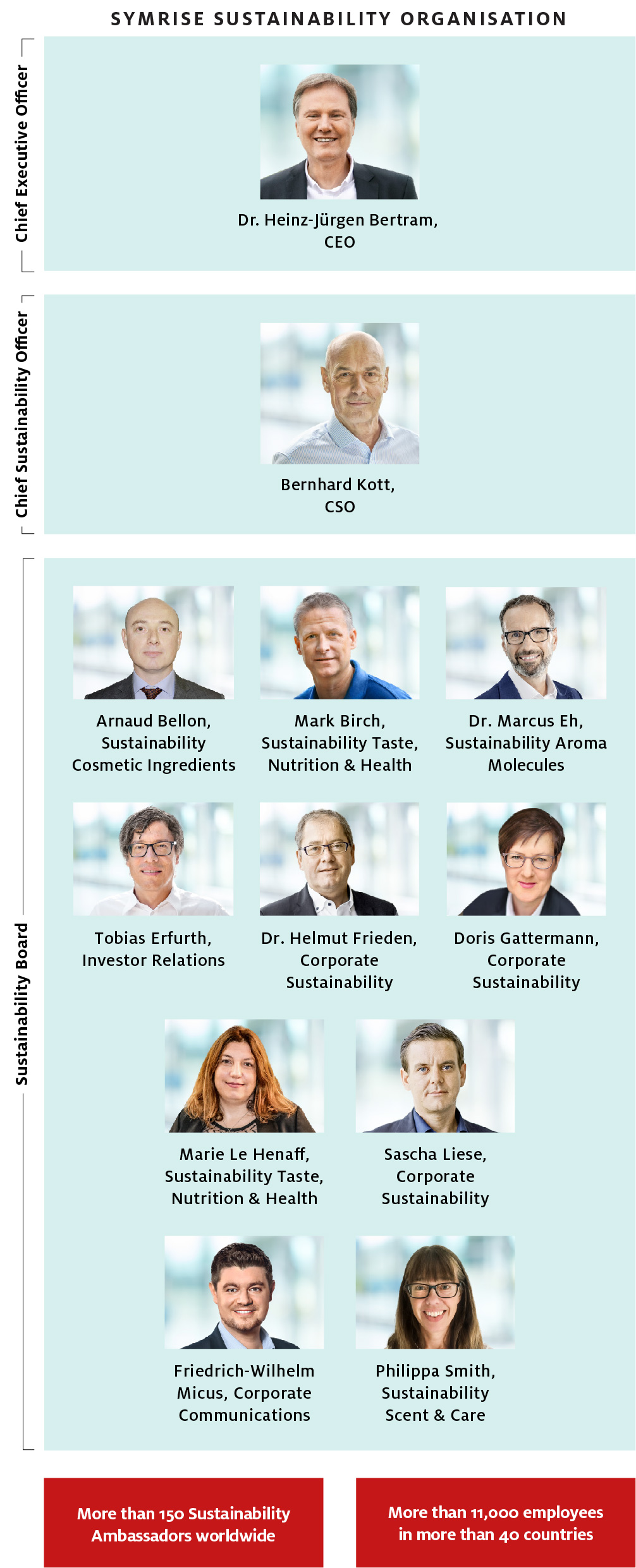Sustainability management
Sustainability is an integral part of the overall purpose, the business model and the corporate strategy at Symrise. Our business activities ultimately depend on the diversity of nature as well as the responsible use and conservation of natural resources.
Sustainability as a business principle
Our business processes follow the principles of the circular economy to a wide extent. We bundle the aspects of sustainability that are relevant to Symrise into the four pillars of environmental protection (Footprint), sustainable innovation (Innovation), raw material sourcing (Sourcing) and employees and society (Care). Concrete goals to be reached by 2025 have been established for each pillar (see 2021 track record and 2025 goals). These are directly related to our key topics and are derived from a number of programs, including the United Nations Sustainable Development Goals (SDGs). Our business model uses this comprehensive approach to combine economic success with sustainable governance and social acceptance.
We are all called upon
At Symrise, sustainability is the business of all employees. Everyone is called upon to constantly monitor the work processes in their own field of activity and responsibility for efficiency, safety and resource conservation, and to develop ideas for improvement. A global network of more than 150 Sustainability Ambassadors promotes targeted initiatives on energy and waste management, climate, water and environmental protection, and occupational health and safety at the corporate locations. Managers are responsible for operationalizing sustainability in their teams and laying out clear goals. Sustainability objectives are also a component of individual goals for all senior executives, including the members of the Executive Board. This advances our sustainability approach consistently in all divisions. The global, cross-business Sustainability Board manages integration of our sustainability principles into the core processes: Under the chairmanship of the Chief Sustainability Officer (CSO), division and staff department management representatives come together multiple times per year to ensure that sustainability-related topics and the concerns of our important stakeholder groups are considered along the entire value chain. The Sustainability Board sets sustainability objectives, which are directly implemented in the respective divisions. To this end, the Executive Board and the Sustainability Board have appointed sustainability officers for the Taste, Nutrition & Health and Scent & Care business segments, as well as one representative each for the staff departments of Human Resources, Finance / Investor Relations, Corporate Communications and Corporate Sustainability. Direct responsibility for strategy lies with the Chief Executive Officer of Symrise AG, who receives regular reports on the progress of all sustainability activities.
In a dialogue with stakeholders and rating agencies
Symrise receives a great deal of external recognition for its commitment to sustainability. For instance, we have already been presented with the German Sustainability Award twice. In addition, the German Association for Sustainability presented Symrise with the “Sustainability Heroes Award” two years in a row – for the Symrise sustainability strategy in 2020 and for “social engagement” in 2021. In 2021, we were also the only company in Germany and one of 14 companies worldwide to receive the firstclass Triple-A CDP rating in the climate, water and forests categories for the second time in a row. We’re proud of this, and it encourages us to intensify our sustainable activities. At the same time, we face mounting challenges, including the increasingly negative consequences of climate change on nature, biodiversity and natural resources as well as the serious effects of the spread of the coronavirus on global supply chains and people around the world. Symrise seeks a dialogue with all relevant stakeholder groups in order to discuss current developments and to meet the needs of various stakeholders regarding sustainable governance. Examples of dialogue platforms are the various WBCSD committees, global representative bodies IFRA and IOFI, and initiatives such as OP2B and the Development and Climate Alliance. We exchange sustainability information particularly closely with the company’s shareholders, investors, voting proxies and rating agencies. Rating agencies MSCI, Sustainalytics and ISS ESG provide especially high-quality and efficient communication of our ESG performance to investors. Moreover, our sustainability performance is regularly evaluated by internationally recognized institutions such as CDP, EcoVadis and SEDEX. Customers as well as investors are interested in the continued development of our sustainability reporting, which will increase the transparency of our business processes and allow for better assessment of the opportunities and risks inherent to our business activities.
